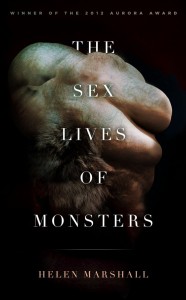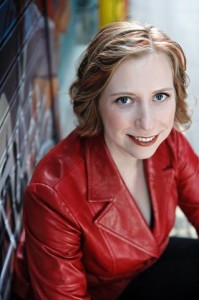Know a Nominee, Part Fourteen: Helen Marshall
Here we are at part fourteen of our ‘Know a Nominee’ series. Helen Marshall’s ‘The Sex Lives of Monsters’ has been nominated for Superior Achievement in a Poetry Collection.
DM: Can you please describe the genesis for the idea that eventually became the work for which you’ve been nominated? In the case of a work wherein you’ve written multiple stories (like a collection) please choose your favourite part and discuss.
HM: The Sex Lives of Monsters came about as a way to explore the notion of the monstrous and the magical in modern culture. “We live in a time of monsters,” the notable critic Jeffrey Cohen writes; “…a society that has created and commodified ‘ambient fear’—a kind of total fear that saturates day-to-day living, prodding and silently antagonizing but never speaking its own name.’” He cites a range of examples from Bigfoot to Jurassic Park, from same-sex marriage and slasher movies to the nuclear bomb as cultural sound bites constitutive of postmodern living. I wrote these poems—in which beasts, ghosts, gorgons, gunslingers, demons, freaks and fiends jostle side by side as expressions of our deepest anxieties—to reflect on what it means to live in a time of monsters.
DM: What was the most challenging part of bringing your idea to fruition? The most rewarding aspect of the process?
HM: I genuinely enjoy the process of collecting pieces and arranging them to create some sort of emotional journey or play upon the central themes, and so the most rewarding aspect of the process is placing texts alongside one another and seeing how they change. In this particular case, I also enjoyed having the opportunity to work with Chris Roberts who did the interior artwork for the collection. Chris is such an excellent reader—he enjoys the process of pulling out details from the text and making them literal—and I find his artwork never fails to expand whatever stories and poetry he is working on.
DM: What do you think good horror/dark fiction should achieve? How do you feel the work for which you’ve been nominated work fits into that ideal?
HM: Good horror writing should provoke an emotional response. I know the genre is primarily concerned with fear, but I think that horror goes beyond that: it is a deeper emotion that has to do with the way we confront the world and our position in the world. In The Sex Lives of Monsters I wanted to explore a range of emotions—fear, monstrosity, loneliness, and tragedy—and relate those emotions to the genre. I like horror writing because it means you can be as confrontational as you want to be, and I get a certain frisson from that.
DM: I’m curious about your writing and/or editing process. Is there a certain setting or set of circumstances that help to move things along? Where do you often find yourself getting stuck, and why?
HM: There’s a famous quotation by C. E. Lombardi that every story has a beginning, a muddle and an end. The place that always gets me is the muddle, the tipping point in the centre of the story or poem where I finally have to make a choice about what the text is about. To me, every story or a poem has a problem embedded in it that I have to solve. Writing the beginning is, for me, about defining the shape of that problem, but in the middle of the story I have to solve that problem. Once I’ve done that, the ending is easy enough because it’s a natural extension of the solution. But I can’t write the ending until I’ve solved the core crux or dilemma. What do I do when I can’t solve that problem? Anything. Everything. I go to museums—there’s an excellent place called the Pitt Rivers Museum about ten minutes from where I live that has shrunken heads and voodoo dolls and all sorts of crazy artefacts so sometimes I’ll just wander around there for a while. Sometimes reading poetry helps me, because it is associative rather than logical, and so it allows me to let my mind wander. Sometimes it helps to do something physical like clean the dishes or wash down my bathroom—anything that allows me to distance myself a little bit from the story or poem and turn it around in my mind, like a Rubik’s cube, until the pieces slot into place.
DM: As you probably know, many of our readers are writers themselves. What is the most valuable piece of advice you can share with someone who may be struggling to make their way in this life?
HM: I suppose the piece of advice I would give is the same piece of advice I struggle with following: work on letting everything else vanish from your mind except for the story. It is very easy to get caught up with the politics of writing, or the frustration, or the disappointment. But you can’t bring any of that with you to the story. The story is the story. It needs space to grow in your mind, and all of those fears will choke it or stunt it, transform it into something it doesn’t want to be. Find a way to approach the page joyously and without fear or reservation.
DM: What are you most looking forward to at this year’s Bram Stoker Awards/WHC (if you are attending)? If not attending, what do you think is the significance of recognitions like the Bram Stoker Awards?
HM: Receiving recognition from your peers is always a tremendous honour: there are so many deserving writers out there and so many of them are inevitably overlooked. I feel tremendously grateful that this community has supported me, that its readers have taken the time to find my work and invest in it—there is no greater reward for a writer than that.
Helen Marshall is an award-winning Canadian author, editor, and doctor of medieval studies. Her poetry and fiction have been published in The Chiaroscuro, Abyss & Apex, Lady Churchill’s Rosebud Wristlet, Tor.com and have been reprinted in several Year’s Best anthologies. Her debut collection of short stories Hair Side, Flesh Side (ChiZine Publications, 2012) was named one of the top ten books of 2012 by January Magazine. It won the 2013 British Fantasy Award for Best Newcomer and was short-listed for a 2013 Aurora Award by the Canadian Society of Science Fiction and Fantasy. The Sex Lives of Monsters is her second poetry chapbook.





